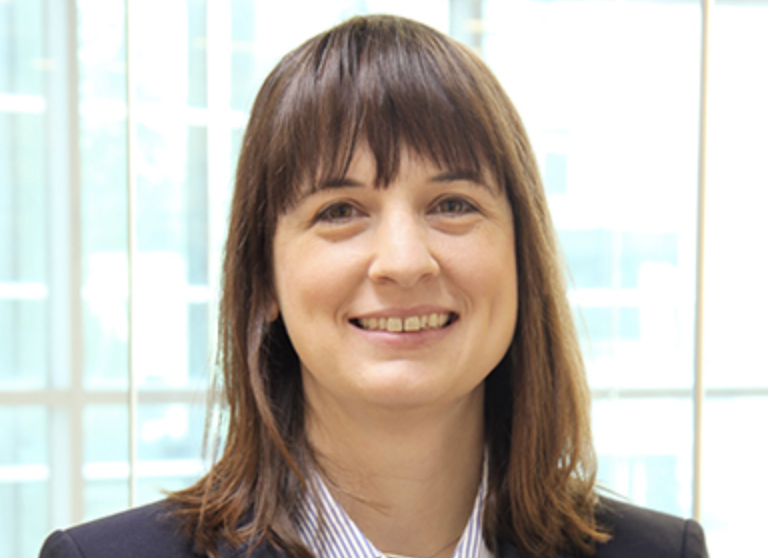International Women’s Day Q&A Spotlight on Lesley MacNeil

Lesley MacNeil is a passionate advocate for women in STEM fields. In her International Women’s Day Q&A spotlight, the IIDR Member and Assistant Professor, Department of Biochemistry and Biomedical Sciences, shares what she learned at this past February’s International Women in Science Day Conference, her mission to fight implicit bias against women, and hints at starting a new writing project about women in science with fellow IIDR member, Dawn Bowdish.
What does your research focus on?
My lab uses a small worm, C. elegans, to understand how genetic and environmental factors function together to influence health.
What are the real world applications of your research?
We are trying to understand how diet and microbiota (the collection of microorganisms that live on and in our bodies) influence disease.
One of our projects looks at the influence of bacterial factors on neurodegeneration in a model of Alzheimer’s disease. Worms and humans have many of the same cellular pathways and biological processes are controlled in the same way by the same proteins. We are using worms as a tool to learn about humans. Using worms, we can also do large-scale experiments that are not feasible in other organisms. We hope that what we learn using our worm models will lead to the development of treatments and interventions that might slow disease progression in Alzheimer’s patients.
What is the most rewarding part about being an IIDR member?
The IIDR is a collaborative research environment. Members of the IIDR have their own areas of expertise but because we have common interests and goals, we build on each other’s research strengths to produce some amazing science. Currently, my lab collaborates with Dr. Mike Surette’s, Dr. Andrew McArthur’s and Dr. Lori Burrows’ labs and we hope to encourage more researchers and trainees at the IIDR to start using the worm as a model system.
What is your proudest accomplishment at the IIDR?
I’m really proud of my students. I have a small lab of students who work very hard and support one another. My graduate student, Sabih Rashid has been generating a large amount of data for his own project and has been helping students from other labs to set up worm assays. My undergraduate student, Andrea Tench worked on four different projects this past summer. She is applying for graduate school in the fall and she is definitely one to watch for in the future.
What is your advice for aspiring female scientists?
My advice for female scientists is: only you know your limitations, don’t let anyone else define them for you. I also really liked what Fiona McNeill said at the International Women in Science Day Conference on February 11: “You can’t do great science unless you fail sometimes.” These are wise words for any person in the science field. If you aren’t failing once in a while then you aren’t really pushing boundaries. It’s ok to fail. Learn from it and be a better scientist because of it.
Why should women and girls have an interest in science and/or pursue a career in science?
Why shouldn’t they? If you look at the undergraduate population, it is pretty clear that women do have an interest in science.
Why is it important to encourage women and girls?
There was an interesting article that came out recently in Science showing that gender stereotypes emerge early. They showed that six and seven year old girls were less likely than boys to opt into games that were described as being for children who were “really, really smart.” This was heartbreaking for me – that young girls are deciding they aren’t as smart as boys at the young age of six. We need to encourage girls and women so that we can reverse these attitudes.
Why is female mentorship important?
There are challenges that are specific to women in STEM fields; getting input from others who have successfully navigated these challenges is important. This isn’t to say that women should only have female mentors. Having both men and women as mentors is important and ultimately, this is critical in creating an environment where there is not a separation of men and women.
The theme for International Women’s Day is “Be Bold for Change” which encourages women to declare what bold action they will take to specifically help drive gender parity. What do you currently do, or what will you do to “Be Bold for Change” in 2017?
Recently, I participated in the YWCA’s “Be the Recipe for Change” program, along with other female faculty in the Biochemistry and Biology departments here at McMaster. We helped Chef Beltran prepare a meal for the 65 women living at the YWCA in Hamilton. This is a great program but it was only one evening and I can do more.
My goal for 2017 is to fight implicit bias against women. This is a real challenge. Having my lab in a hospital, I have been asked several times, “Are you a nurse?” Not once have I been asked, “Are you a doctor?” It is difficult to fight these preconceived notions about women’s roles in society but one way we can do this is by increasing the visibility of women in science. Last year, I participated in science outreach events with primary and high school students and I will continue to do this in 2017. I think that we need to educate people about implicit bias and its consequences. This could be the year Dr. Dawn Bowdish and I start writing our book about women in science. To be continued…
Look out for more Q&A spotlights on women at the IIDR throughout March and learn about their fascinating research, achievements, advice for women in science and what they’re doing to #BeBoldForChange in 2017.
NewsRelated News
News Listing

McMaster Health Sciences ➚
Overcoming resistance: McMaster researchers find new utility for old antibiotics
News
January 6, 2025

December 19, 2024


